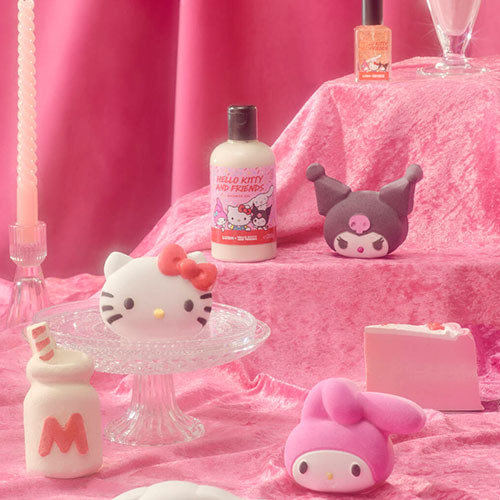Start Licensing’s Ian Downes visits Elphicks in Farnham and explores why department stores are such an important part of the fabric of town centres.
Most small towns I visit seem to have department stores. These are always quite large shops with a multi product mix and tend to be a signature store on the high street.
These stores are generally independent ones or are a part of small groups. They tend to have a long association with the town they are located in. They are part of the community and a vital part of the local retail economy. However, it seems to be tough times for this category of retail.
I used to visit the Tudor Williams store in New Malden quite frequently. Sadly it closed in 2019 after 106 years of trading. The shop site is being converted to flats I believe. Tudor Williams’ closure has changed the dynamics of New Malden high street. The reason for its closure was due to a downturn in sales. It is hard to say but its core customers may have migrated to shop elsewhere including online.
Many of these department stores also relied on older customers and have struggled to attract younger customers. Tudor Williams owns and operates a couple of other department stores including Elphicks in Farnham. As I was in Farnham this week, I decided to pop in for old times sake with a nod to Tudor Williams.
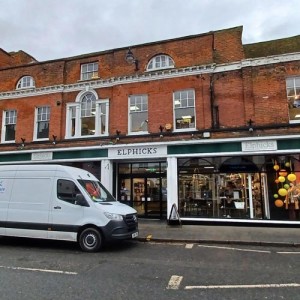 Elphicks was first established in Farnham in 1881 on a smaller scale, but clearly it has a long association with the town. Farnham has a good mix of retailers including some big names like Waitrose, WH Smith,Robert Dyas, Poundland and Sainsbury’s, alongside shops like Oliver Bonas blended with independents like the Blue Bear Bookshop. There is a good mix of retailers and restaurants, but like many town centres it also has its fair share of empty retail units. Indeed, Elphicks was running a clearance event in some parts of the store with prices reduced by up to 50%.
Elphicks was first established in Farnham in 1881 on a smaller scale, but clearly it has a long association with the town. Farnham has a good mix of retailers including some big names like Waitrose, WH Smith,Robert Dyas, Poundland and Sainsbury’s, alongside shops like Oliver Bonas blended with independents like the Blue Bear Bookshop. There is a good mix of retailers and restaurants, but like many town centres it also has its fair share of empty retail units. Indeed, Elphicks was running a clearance event in some parts of the store with prices reduced by up to 50%.
The first thing I noticed in Elphicks is its strong commitment to greeting cards. The greeting cards department is quite sizeable and well stocked. My visit was on Valentine’s Day and there was a plentiful supply of Valentine’s cards in stock – hopefully there was a last minute rush on those cards. Licensing featured in the card department quite frequently with suppliers like Woodmansterne to the fore. Ranges that stood out included Quentin Blake’s cards that feature his charming illustrations.
These have been well chosen and are well matched to specific sending occasions. Not unexpectedly for a town that is surrounded by National Trust land and property, Elphicks stocks National Trust cards in depth. It carried at least two ranges – one an illustrated style and the other photographic. One of the strengths of stores like Elphicks is their ability to make local buying decisions and buy into stock that reflects their customer base.
Of course, a challenge here is their buying power. I know some department stores buy through a buying group, but it would be nice to think suppliers recognise the local buying of department stores and are able to accommodate them.
It was also good to see The Wooden Postcard Company in Elphicks. It had a branded spinner from the company which included a range of wooden postcards featuring Matt Sewell’s Birds. These are charming illustrations that featured in Matt Sewell’s Birds book and reflect Matt’s background as a street artist. He really has a very distinctive style and his art offers a new perspective on a traditional subject.
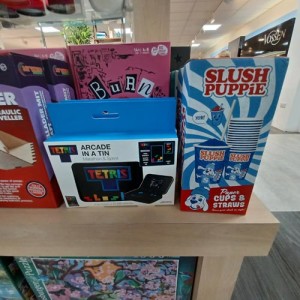 Having just got back from Spring Fair, it was good to see a couple of products that I had spotted in Birmingham.
Having just got back from Spring Fair, it was good to see a couple of products that I had spotted in Birmingham.
Elphicks had a good selection of pick up gifts including Fizz Creations’ Arcade in a Tin Tetris product and the Slush Puppie Paper cups and straws set. Seeing product in store that was featured at Spring Fair is a welcome reminder of the link between trade show and retailer.
One thought I had last week and this was how exhibitors at shows like the Spring Fair can really help retail buyers by displaying products on their stand in ways that buyers can translate into their store setting.
Licensed products in particular are good display pieces and in the context of Elphicks I can see that it is using licensed brands proactively. There is a University in Farnham and I think Elphicks has included some gift lines with the student market in mind. Again, a good example of local buying knowledge.
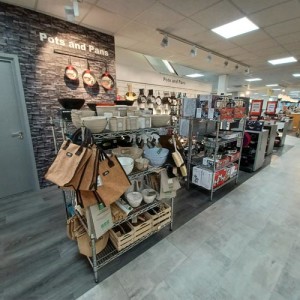 Elphicks has a large cookware and kitchenware department or as it puts it, Pots And Pans. This was relatively licensing light, but there was a great display of Sophie Conran’s tableware and kitchenware. This is a Portmerion range. I believe this is a long standing partnership and from a retail buyer’s point of view is, I assume, a proven seller. The range displays well and the green colourway used for the packaging is eye catching. In the current retail context I imagine buyers at stores like Elphicks are loathe to make too many changes, preferring to keep solid sellers in stock.
Elphicks has a large cookware and kitchenware department or as it puts it, Pots And Pans. This was relatively licensing light, but there was a great display of Sophie Conran’s tableware and kitchenware. This is a Portmerion range. I believe this is a long standing partnership and from a retail buyer’s point of view is, I assume, a proven seller. The range displays well and the green colourway used for the packaging is eye catching. In the current retail context I imagine buyers at stores like Elphicks are loathe to make too many changes, preferring to keep solid sellers in stock.
Another featured supplier was Creative Tops. It has developed a branded space for the products which included a small amount of licensed product, most notably William Morris. Morris & Co also featured in the bedding department which also included some Terence Conran bedding, but it was again a department that in relative terms was licensing light.
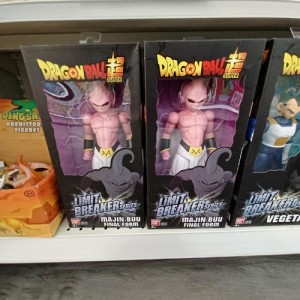 Elphicks has a large toy and games department. I am not aware of a standalone toy shop in Farnham, but there are other shops selling toys including Waterstones, WH Smith and Robert Dyas. My sense is that this is a category that Elphicks does well in and is a little bit of a destination store in the town. It is a well stocked department and makes good use of well known toy brands with dedicated space for brands like LEGO and Playmobil. Licensing and licensed products feature throughout the department.
Elphicks has a large toy and games department. I am not aware of a standalone toy shop in Farnham, but there are other shops selling toys including Waterstones, WH Smith and Robert Dyas. My sense is that this is a category that Elphicks does well in and is a little bit of a destination store in the town. It is a well stocked department and makes good use of well known toy brands with dedicated space for brands like LEGO and Playmobil. Licensing and licensed products feature throughout the department.
Interestingly, Bandai had got some Dragon Ball figurines listed in-store. I thought this was a further sign of the growing popularity of manga and anime brands. A few years ago I doubt a shop like Elphicks would have stocked products like this. Elphicks seems to like to back well known characters when teamed up with well known toy companies – for example TOMY, Toomies and Peppa Pig and Pokémon and Ravensburger. I sense this comes back to a safety first approach backing brands and suppliers that have worked well over the years. Plus trusting suppliers that as a retailer you know will support you and keep stock flowing into the store.
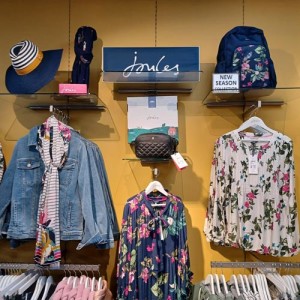 Elphicks is a two floor building and the top floor is dedicated to apparel. This was a department I saw little or no licensing, but what I did see was a series of concession areas with brands such as Joules, Barbour and Joe Browns featuring. I presume Elphicks has worked with the suppliers to create showcase areas and have placed faith in brand power
Elphicks is a two floor building and the top floor is dedicated to apparel. This was a department I saw little or no licensing, but what I did see was a series of concession areas with brands such as Joules, Barbour and Joe Browns featuring. I presume Elphicks has worked with the suppliers to create showcase areas and have placed faith in brand power
I guess this is a category which is particularly challenging for an independent department store as they are competing with ecommerce sites, bigger retailers in general terms and in some cases the relatively fast turnround in fashion collections. Elphicks was offering a good selection of apparel brands and had worked hard to create an attractive shopping environment for clothes shopping.
It will be interesting to see how Elphicks responds to the current challenges in retailing, but shops like Elphicks are in my view an important part of the fabric of town centres. Maybe they need to think about new ways of retailing and, of course, think about younger consumers but it would be a shame to see shops like Elphicks disappear. They provide a great service to local communities and are good local employers. I like the fact that stores like Elphicks can provide a retail mix that reflects the local area and consumers.
I know a lot of people in New Malden miss Tudor Williams. Maybe the lesson to be learned from that experience is to support your local department store.
Ian Downes runs Start Licensing, an independent brand licensing agency. His Twitter handle is @startlicensing – he would welcome your suggestions for what to look out for.



























